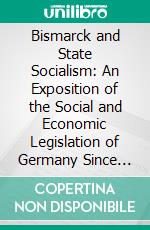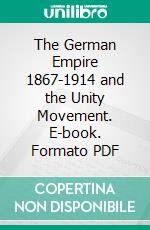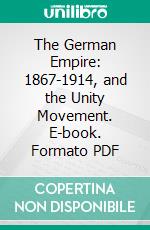William Harbutt Dawson eBooks
eBooks di William Harbutt Dawson
Bismarck and State Socialism: An Exposition of the Social and Economic Legislation of Germany Since 1870. E-book. Formato PDF William Harbutt Dawson - Forgotten Books, 2017 -
"I need very little recognition, and am tolerably unsusceptible against criticsim." - June 2, 1865."At any rate it must be allowed that I have always expressed my convictions decidedly, clearly, and openly." - December 17, 1873." I am a statesman who subordinates himself to the needs and requirements of the State in the interest of the peace and prosperity of my Fatherland." - December 17, 1873."I have always endeavoured to learn new things, and when I have as a consequence had to correct an earlier opinion, I have done it at once, and I am proud to have done so, for I ever place my country before my person." - March 28, 1874."I aim at definite, positive, practical ends." - October 9, 1878."For my part I shall certainly follow to the end the way which I believe to be the best in my country's interest; whether my reward be hatred or love, is all the same to me." - July 9, 1879."I do my duty and await the result." - April 2, 1881.
The German Empire 1867-1914 and the Unity Movement. E-book. Formato PDF William Harbutt Dawson - Forgotten Books, 2017 -
Satisfied that he had put the Socialists in their right place in relation to public law and decorum, Bismarck proceeded to restore order in another part of the national house. The year which followed the passing of the anti-Socialist Law saw the reform of the fiscal system, a task still greater, calling for statesmanship of a more delicate kind and charged with consequences at least as far-reaching, though in other directions.To regard this episode, as is often done, as an abrupt and violent new departure is to misunderstand and undervalue its significance. The introduction of protective legislation in 1879 was in reality the revival of a national tradition. This tradition had been based on the example of Prussia, where the protection of trade, industry, and agriculture had been the careful aim of public policy from the time of Frederick the Great. Not only did that ruler erect fiscal barriers upon his frontiers for the purpose of restricting imports, but his edicts went so far as to forbid the introduction of every class of goods which could be produced at home, even if less cheaply and of inferior quality. On the other hand, the exportation of raw material was forbidden in the interest of cheap production. By subsidies he established new industries, and encouraged old industries which languished. If the foreigner's goods were not desired, the foreigner himself was welcomed, provided only that he brought with him manufacturing skill and knowledge. The State was ever ready with liberal gifts or temporary loans for the purchase of raw materials, and it was quick to recognize the value of technical training, introducing for the purpose foreign teachers. Agriculture was likewise supported in every suitable way.
The German Empire: 1867-1914, and the Unity Movement. E-book. Formato PDF William Harbutt Dawson - Forgotten Books, 2017 -
It has been my desire to make this survey of the modern political history of Germany something more than a compendium of facts or a work of reference, and the public which I have had in mind in writing it is less the limited circle of scholars and students than those "general readers," the number of whom, one may believe, is steadily increasing, who wish to form their opinions on foreign politics independently, intelligently, and therefore on adequate information.Inasmuch as my chief concern is with the German Empire as established in 1867-1871, only so much attention has been given to the earlier phases of the national unity movement as seemed needful in order to make the later developments intelligible. Hence in dealing with the first half of last century I have concentrated attention upon capital events and tendencies, and in referring to the actors in these have refrained from dragging out of obscurity and oblivion personalities and reputations which, tried by the test of time, have proved to have had significance only for their own day, or even for their own narrow political circles.Rightly or wrongly, I have not written this History impersonally, nor have I tried so to write it. Had I adhered more faithfully to conventional forms, the work of writing it would have lost half its interest for me, and it may be that the result for the reader would have been less helpful. I shall be satisfied if it should be held that I have succeeded in preserving the mean between a colourless formalism and excessive subjectivity. It has also seemed to me natural to give special prominence to points of contact with my own country, yet without writing from the British standpoint, and this inclination I have not unduly restrained.In discharging my task, an old reflection has repeatedly returned to me: How comes it that in normal conditions German politics make so slight an appeal to the outside world.? Why does German political life at any time so little interest observers in this country in particular?


